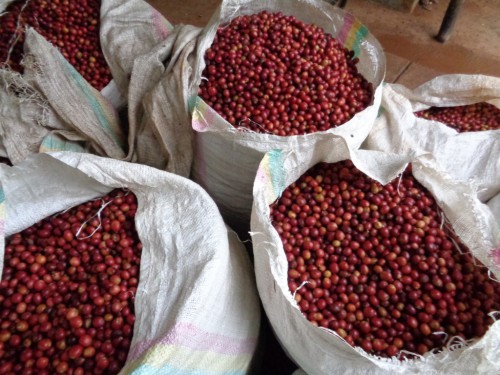AGLC scientists engage with FAO
What makes coffee so uniquely important for Rwanda’s agricultural growth? The AGLC Team has identified 8 fundamental arguments to support investing in the coffee sector.
By David Ortega

September 5th, 2017, FAO hosted a webinar on the Coffee Sector in Rwanda, inviting FSP Africa Great Lakes Coffee (AGLC) scientist David Ortega to present findings on the Sustainable Growth in Rwanda’s Coffee Sector (See the PPT presentation).
The coffee sector in Rwanda supports 350,000 households, and constitutes a significant portion of the country’s foreign income. Although Rwandan coffee is one of the best specialty coffees in the world, its production remains low, with farmers investing little in this crop. For the last 3 years, the AGLC team has been collecting data on coffee farmer’s socio-demographic characteristics such as education, income, as well as on the farms themselves (number of trees, productivity, labor, etc). These results are informing policies to promote the Rwandan coffee economic sector. For example, the team established the actual cost of production of coffee to the farmers. Based on these results, in early 2017, the government of Rwanda increased the floor price of coffee, improving the livelihoods of thousands of farmers, while remaining competitive in the region.
What makes coffee so uniquely important for Rwanda’s agricultural growth?
Bringing coffee back as a national priority has to begin with a clear and compelling understanding of its market potential, agro-ecological attributes, and contributions to food security among its producers. The AGLC Team has identified eight fundamental arguments in support of why stakeholders in the coffee sector, both public and private, must organize and take necessary collective action to restore coffee as a pillar of Rwanda’s rural economy:
- Coffee is a longstanding source of export earnings and economic growth
- Coffee directly affects the lives of over 350,000 farmers and their families
- Specialty coffee is in high and growing demand worldwide
- Specialty coffee has price stability in global markets (compared to ordinary coffee)
- Comparative advantage: Rwanda stands out in specialty coffee
- Coffee is environmentally superior to most other crops grown in Rwanda
- Rwanda is expected to remain highly suitable for coffee production under predicted climate change scenarios.
- Dedicated coffee producing households have better food security
The invited talk at the FAO headquarters in Rome is one of many ways in which scientists working under AGLC are engaging with policy makers and stakeholders to inform policies affecting Rwanda’s coffee sector.



 Print
Print Email
Email




